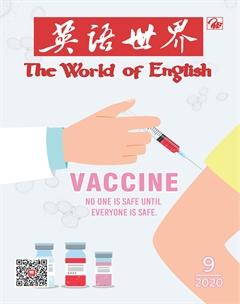疫苗知识问答
赵晨辉
Vaccines are one of our most effective health interventions, but are often misunderstood. In this Q&A, we explain what they are, how they work and why they are important.
What is a vaccine?
Were protected from infectious disease by our immune system, which destroys disease-causing germs—also known as pathogens—when they invade the body. If our immune system isnt quick or strong enough to prevent pathogens taking hold, then we get ill.
We use vaccines to stop this from happening. A vaccine provides a controlled exposure to a pathogen, training and strengthening the immune system so it can fight that disease quickly and effectively in future. By imitating an infection, the vaccine protects us against the real thing.
Why are vaccines important?
They protect us from dangerous diseases. In some regions or populations, dangerous diseases are constantly present (endemic). Examples include hepatitis B, cholera and polio. So long as these diseases are around, we need vaccines to bolster1 our immune systems and protect us from harm.
They protect children and the elderly. Our immune systems are strongest in adulthood, meaning that young children and the elderly are particularly susceptible2 to dangerous infections. By strengthening our immune systems early and late on in life, vaccines bypass this risk.
They protect the vulnerable. If enough of a population is vaccinated, infections cant spread from person to person, which means that everyone has a high level of protection—even those who dont have immunity. This is known as herd protection (or herd immunity). Its important because not everyone can be directly protected with vaccines—some people are unresponsive to them or have allergies or health conditions that prevent them from taking them.
They can help us control epidemics. In a world of denser cities, increased international travel, migration and ecological change, the ability of emerging infectious diseases (such as Ebola) to spread and cause devastation is increasing. Vaccines can be a key tool in managing this threat—but only if we have them ready for diseases when they appear.
They can help limit drug resistance. Medicine relies on being able to treat infectious diseases with antimicrobial3 drugs, such as antibiotics, but overuse and misuse of these drugs is leading to infections becoming resistant to them. By preventing infections that would require drug treatments, vaccines reduce the opportunity for drug resistance to develop.
For other diseases, its a question of process: there may already be several promising vaccine candidates in development, but rigorous safety and efficacy testing to make sure they work properly means that an actual approved vaccine is still years away. Developing a vaccine typically takes over a decade.
This is a particular problem with diseases that appear intermittently6, as theres limited scope for testing vaccines to fight them. This is why its really important to have vaccine candidates for emerging diseases ready for when outbreaks occur—so that they can be tested, approved and begin protecting people as quickly as possible, before an outbreak can harm too many people. Today we have a vaccine for Ebola only because candidates were ready to test at the beginning of the West African outbreak in 2014—and even then we were too late to prevent over 11,000 deaths.
Finally, the absence of a vaccine may be down to economics. Vaccine development costs are often quoted in the billions, but many diseases without vaccines disproportionately affect low- and middle-income countries. Pharmaceutical companies have little incentive to invest in treatments that are unlikely to return a profit. This leads to diseases that predominantly affect the low-income world becoming neglected.
疫苗是最有效的健康干預措施之一,但却经常被误解。在这篇问答中,我们会解答疫苗是什么、疫苗如何工作,以及疫苗为什么很重要。
疫苗是什么?
我们自身的免疫系统保护我们免受传染病的侵害。当致病微生物——也称为病原体——侵入人体时,免疫系统会摧毁它们。如果我们的免疫系统应对不够快速或力量不够强大,无法阻止病原体立足生根,那我们就会生病。
我们用疫苗来阻止这种情况的发生。疫苗可以让人体有控制地接触病原体,训练强化免疫系统,这样,将来就能快速且有效地战胜疾病。通过模拟感染,疫苗保护我们不会真的染病。
为什么疫苗很重要?
疫苗可以保护我们免受危险疾病的侵害。在某些地区或人群中,经常出现危险的疾病( 地方病),包括乙型肝炎、霍乱和小儿麻痹症等。只要这些疾病还在,我们就需要疫苗来增强免疫系统,保护我们免遭伤害。
疫苗可以保护儿童和老人。我们的免疫系统在成年时最强,这意味着幼儿和老年人尤其容易受到危险的感染。借助疫苗,在生命的早期和晚期增强免疫系统,则可以避开这一风险。
疫苗可以保护体弱的人。如果人群中有足够多的人接种了疫苗,传染病就不会出现人际传播,这意味着每个人都能得到高水平的保护——即使是那些没有免疫力的人。这就是众所周知的群体保护(或群体免疫)。群体保护很重要,因为并不是每个人都能直接得到疫苗的保护——有些人接种疫苗后没有反应,还有些人有过敏症或健康状况不适合接种疫苗。
疫苗可以帮助我们控制流行病。当今世界,城市人口更为密集,国际旅行更加频繁,人口移徙增加,生态环境变化加快,新出现的传染病(如埃博拉)的传染性变强且破坏力增大。疫苗可以成为应对这一威胁的关键工具——但前提是我们要在疾病出现时把疫苗准备好。
疫苗有助于限制病毒的耐药性。医治传染病依靠的是能够使用抗生素类杀菌药物,但是,由于过度使用和误用这些药物,传染性疾病正在对这些药物产生耐药性。通过预防需要药物治疗的传染病,疫苗可以降低耐药性产生的几率。
疫苗是健康干预的最有效手段。据估计,疫苗每年可防止全球200万到300万人死亡。不过,如果全球疫苗覆盖率能进一步提高,每年还可以多挽救150万人的生命。
疫苗是如何工作的?
我们的免疫系统通过区分物质是否属于我们身体来对抗疾病,如果不属于就加以摧毁。免疫系统通过外来异物表面叫作抗原的标记物来识别它们。
疫苗的工作原理是让免疫系统接触病原体的抗原,病原体就是会导致某种疾病的物质,比如病毒或细菌。免疫细胞遇到这些抗原时,会产生反应。一种B细胞开始产生抗体,抗体与外来物质结合,使其失去破坏力,将其标记并摧毁。其他被称为T细胞的免疫细胞攻击并摧毁被病原体感染的身体细胞。
与此同时,人体还会产生长寿型的白细胞——称为记忆T细胞和记忆B细胞——它们能记住刚刚遇到的抗原。如果免疫系统再次遇到相同的抗原,这些记忆细胞会让人体对特定的病原体产生非常迅速且强烈的反应,因而得病的可能性就很低了。
谁来决定哪些人该接种疫苗?
各个国家可以制定自己的疫苗政策,因此世界各国的疫苗政策也各不相同,一些国家选择强制接种某些疫苗。
例如,斯洛文尼亚要求所有儿童须在入学前接种九种主要疾病的疫苗。只有由于医学原因不宜接种的儿童才能获准免予接种,不遵守规定的父母将被罚款。
另一方面,其他一些欧洲国家,以及澳大利亚和加拿大,不强制要求接种疫苗。在那些国家,父母或(年龄足够大的)个人自己决定是否接种。
不过,这些国家的政府可能会推出激励措施,以确保疫苗接种保持在较高水平。例如,在澳大利亚,只有孩子接种了所有常规疫苗,父母才能从政府那里获得某些儿童福利。
为什么不是每一种传染病都有疫苗?
对某些疾病来说,这是一个难以解决的问题。
例如,艾滋病病毒可以将自身嵌入人体细胞的遗传物質,并藏匿其中而不被发现。其他病毒,如登革热,存在多种毒株,因而很难研制出一种能覆盖所有毒株的疫苗。对于其他病原体来说,问题在于病毒突变:持续的变异意味着免疫系统基本上每次都会遇到新的威胁,使过去让免疫细胞接触病原体的努力变得毫无意义。这就是普通感冒如此棘手的原因。
对于其他疾病来说,疫苗研发只是一个过程问题:几个有希望的候选疫苗可能正在研发中,但是,为确保它们安全有效,需要经过严格的安全性和有效性试验,这意味着距离疫苗真正获得批准投入使用仍有数年时间。研发疫苗通常需要10多年。
间歇性出现的疾病是一个特别麻烦的问题,因为测试对抗它们的疫苗范围有限。这就是为什么疫情暴发时为出现的疾病提前准备好候选疫苗非常重要——这样就可以在疫情伤害太多人之前尽快试验、批准及投入使用,开始保护人们。今天,我们有了埃博拉疫苗,恰恰因为候选疫苗在2014年西非埃博拉疫情暴发之初就已准备进入试验阶段——尽管如此,我们也没来得及阻止11000多人的死亡。
最后,疫苗的缺乏可能是由于经济原因。疫苗研发成本通常以10亿计,但许多没有疫苗的疾病对中低收入国家的影响尤甚。制药公司对投资不太可能盈利的药物缺乏动力。这也导致主要在世界低收入地区传播的疾病遭到忽视。
(译者为“《英语世界》杯”翻译大赛获奖者)

